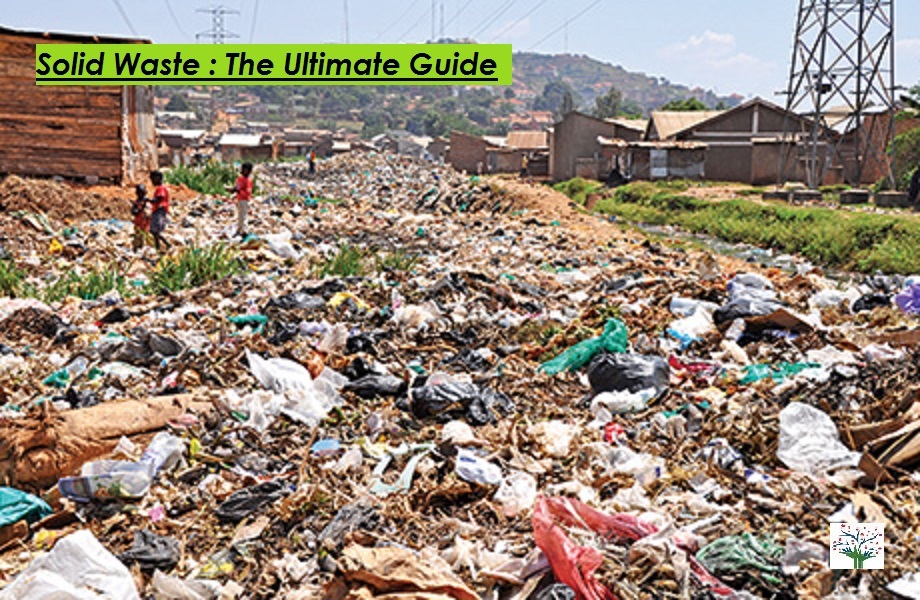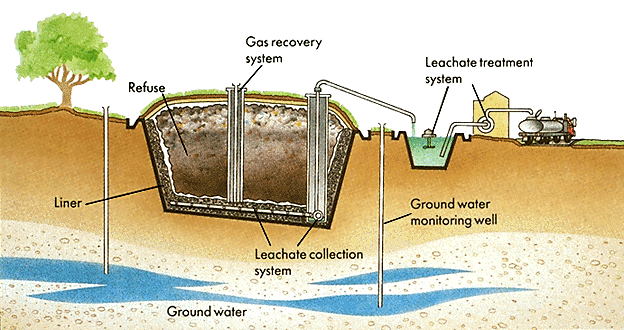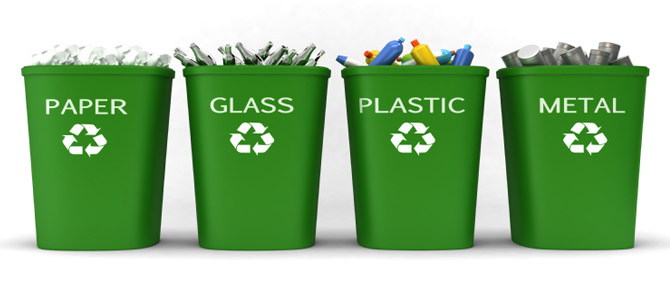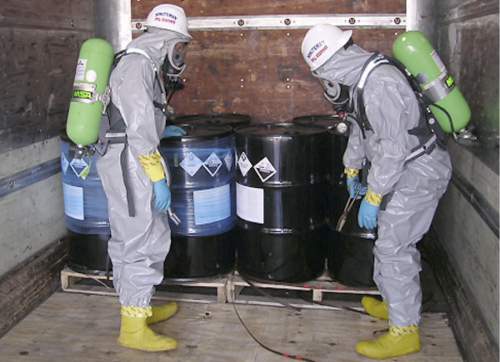Solid Waste – The Ultimate Guide
Solid waste can be defined as any type of waste is generated by every day human activities. It can be in the form of household garbage, food, plastic, etc.
The Waste Stream
- The waste stream is a term that describes the steady flow of varied wastes that we all produce.
- Many materials in the waste stream would be valuable resources if they were not mixed with other garbage.
- A problem with refuse mixing is that hazardous materials in the waste stream get dispersed through thousands of tons of miscellaneous garbage.
Types of Solid Waste
The origination of hazardous waste is started from Human civilization, when human started to consume animal products and generated garbage from their bones and their other remaining parts. Slowly human started to live in more advanced manner and waste also started to increase in form of wood, metals, other complex materials.
At the beginning of 19th century due to increase in industrialization to produce goods there was substantial amount of growth in solid waste.
We offer Environmental monitoring testing services for companies.
Solid waste can be divided into three parts:
Municipal Solid Waste
Generally household waste is categorized in municipal solid waste. It also consists of waste from streets, demolition debris, etc. due to increase in urbanization municipal solid waste is increasing day by day. Also due to increase in metropolitan cities there is enormous amount of solid waste is generated.
Hazardous Waste
Industrial waste is called as hazardous waste.
This type of waste is considered as quite dangerous for nature as they contains toxic substances. Improper disposal of these substances can lead to death or disease. For e.g. release of poisonous gas, chemicals in air or untreated disposal of effluent wastewater into soil may lead to destruction of all living species.
Biomedical Waste
The other form of solid waste is generated at hospitals. It is also known as hospital waste. It is generally generated by majority by hospitals, clinics, research centers, pharmaceutical companies, and health cares.
This type of solid waste is very infectious and can spread diseases and other type of viral and bacterial infections to human and other animals. The hospital waste includes syringes, human blood, bandages, cotton swabs, body fluids, expired medicines, etc. Hospital waste is also dangerous as hazardous waste if not disposed properly.
Perfect Pollucon Services offers Services in Stack emission testing.
Solid Waste Management
Modern waste management stresses the three R’s: Reduction, Reuse, and Recycle.
Open Dumps
- Open, unregulated dumps are still the predominant method of waste disposal in most developing countries.
- Most developed countries forbid open dumping, but illegal dumping is still a problem.
- Illegal dumping is also partly responsible for large amounts of toxic chemicals showing up in the drinking water.

Ocean Dumping
- Every year, millions of tons of trash and waste are dumped in the ocean.
- Until recently, many cities dumped municipal refuse, industrial waste, and sewage into the ocean. Federal legislation now prohibits this dumping.
- Some argue that the deep ocean is the most remote, stable, and innocuous place to dump our wastes. Others argue that we know too little about the values of these remote places or the rare species living there to smother them with sludge and debris.
Landfills
- Landfills are areas where solid waste disposal is regulated and controlled. Operators are required to compact and cover waste with a layer of dirt each day.
- This method helps control pollution but the dirt fill takes up as much as 20% of the landfill space.
- Modern municipal solid waste landfills have many safeguards to prevent leakage and contamination of the surrounding area.
- Rising land prices and shipping costs are making landfills an expensive waste disposal option.
- Suitable sites for landfills are also becoming scarce.

Exporting Waste
Most industrialized nations have agreed to stop shipping hazardous waste to less developed countries. The practice still continues, illegally and with dangerous consequences, in some areas.
Perfect Pollucon Services offers Air quality testing services for Homes and Offices.
Incineration and Resource Recovery
- Energy recovery is a term referring to the burning of waste to produce heat which is converted into energy and power.
- In some municipal incinerators, refuse is sorted into burnable, nonburnable, and recyclable before it is burned. The burnable waste is called refuse-derived fuel because the burnable fraction has a higher energy content than the raw trash.
- Mass burning refers to an approach where everything smaller than sofas and refrigerators are dumped into a giant furnace and as much as possible is burned.
- The cost effectiveness of garbage incinerators is the subject of heated debates. Environmental safety and use-fees are all subjects of contention.
Shrinking the Waste Stream
Having less waste to discard is obviously better than struggling with disposal methods. Here we will discuss various methods for reducing the amount of waste we produce.
Recycling
- Recycling has two meanings. It can mean reusing something as is or reprocessing something into useful products.
- Recycling is a better alternative to either dumping or burning. It saves money, energy, raw materials, and land space and reduces pollution.
- There are also problems associated with recycling. The wild fluctuation in the market prices for recyclable commodities is one. Also, contamination of products in recycled containers can occur.
- Public policy has also created incentive for recycling. Some communities have active recycling campaigns and deposit fees on recyclable items.

Composting
- Composting is a process in which organic yard waste is broken down by bacteria into a nutrient rich soil amendment.
- Compost piles are an easy, inexpensive, environmentally friendly way of disposing of organic wastes.
We offer noise testing services for homes and offices.
Energy from Waste
Organic wastes can be broken down by bacteria to produce methane. This gas can then be harnessed as a fuel source.
De-manufacturing
- De-manufacturing is the disassembly and recycling of obsolete consumer products, such as TV sets, PCs, and air conditioners.
- This allows for the recapturing of valuable materials and toxic materials before they are released into the environment.
Reuse
Reusing waste is the best method of waste disposal. Cleaning and reusing materials in their present form saves both energy and costs.
Producing Less Waste
- Excess packaging of food and consumer products is one of our greatest sources of unnecessary waste. Much of that packaging has to do with marketing and little to do with product protection.
- Less volume of waste can be produced by using degradable materials. Photodegradable plastics break down under UV light. Biodegradable plastics can be decomposed by microorganisms.
Hazardous and Toxic Wastes
- The U.S. EPA estimates that 256 million tons of officially classified hazardous wastes are produced in the U.S. each year. This does not include toxic and hazardous waste produced by industries not monitored by the EPA.
- The biggest sources of hazardous wastes are the chemical and petroleum industries.
What Is Hazardous Waste?
A hazardous waste is any discarded material, liquid or solid, that contains substances known to be:
- Fatal to humans or lab animals in low doses,
- Toxic, carcinogenic, mutagenic, or teratogenic to humans or other life-forms,
- Ignitable with a flash point less than 60oC,
- Corrosive
- Explosive or highly reactive.
Options for Hazardous Waste Management
- The safest and least expensive way to avoid hazardous waste problems is to avoid creating the wastes in the first place. The 3M Company has reformulated products and redesigned manufacturing processes to eliminate tons of waste and pollution from their factories. They found that not only were these new processes safer and more environmentally friendly, but also they were often cheaper.
- Recycling and reusing materials also eliminates hazardous wastes and pollution.
- Several processes are also available to make hazardous substances less toxic. Physical treatments tie up or isolate substances. Incineration is applicable to mixtures of wastes. A permanent solution to many problems, it is not necessarily cheap nor clean. Chemical processing can transform materials so they become nontoxic.

- There are communities which accepts hazardous waste for proper disposal. You can connect to them in case you need immediate assistance in hazardous waste disposal.
- Bioremediation taps the great capacity of microorganisms to absorb, accumulate, and detoxify a variety of toxic compounds.
- Permanent retrievable storage means placing waste storage containers in a secure building, salt mine, or bedrock cavern where they can be inspected periodically or retrieved.
- Secure landfills are specially designed landfills made for disposing of toxic wastes.
Summary
- Volumes of solid waste is produced in industrial societies, and how to dispose of it is an increasing problem.
- Solid wastes are domestic, commercial, industrial, agricultural, and mining wastes that are primarily non-toxic.
- There are many methods of solid waste disposal, including landfills and incineration, each of which has associated problems.
- Hazardous and toxic wastes, when released into the environment, cause many health problems including cancer and birth defects.
- Disposal practices for hazardous wastes have often been unsatisfactory. Government legislation and alternative disposal practices are creating safer, more effective ways of dealing with this increasingly serious problem.


According to Value Market Research, the latest technology trends and global market opportunity analysis in the Medical Waste Management Market industry growing with a high CAGR in the upcoming year. Our report has categorized the market based on technology, service, development, vertical and region. https://www.valuemarketresearch.com/report/medical-waste-management-market
This post made an excellent point that it is important that we practice the proper waste management as to prevent pollution. I do agree that hiring a service to help educate on the proper waste disposal is beneficial. I will definitely look into it further.
Dear Kristofer,
Thank you so much for your valuable feedback.
Thanks,
PPS Team